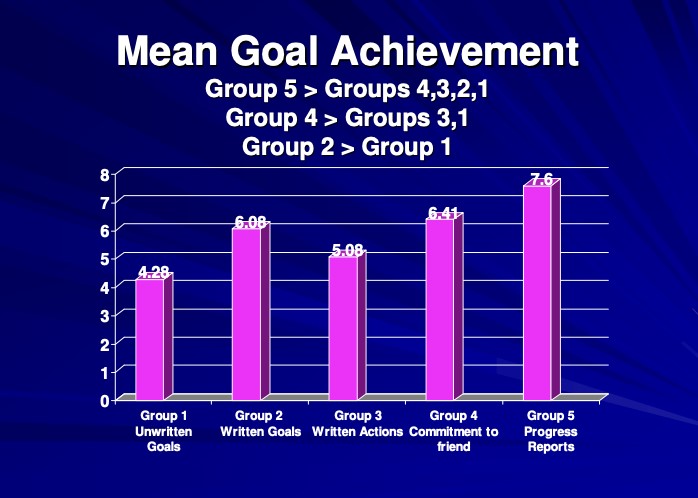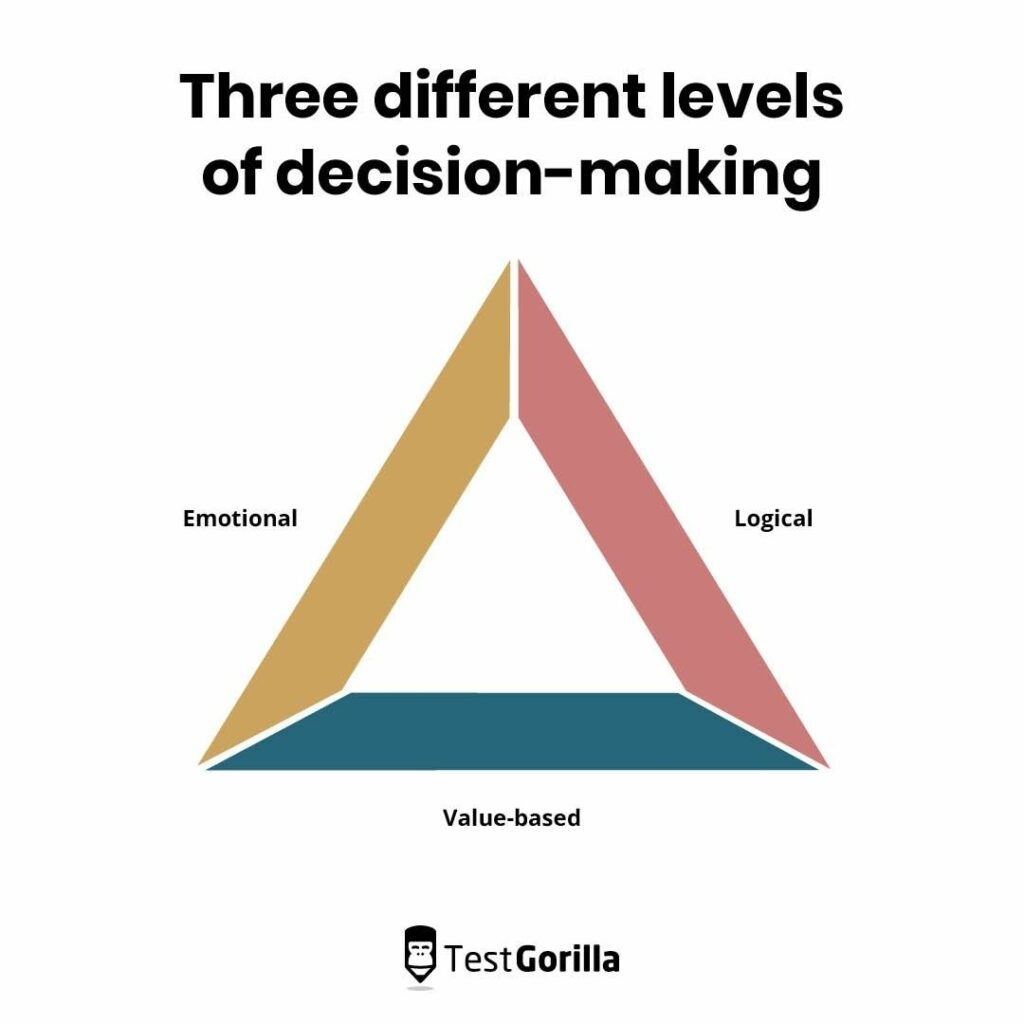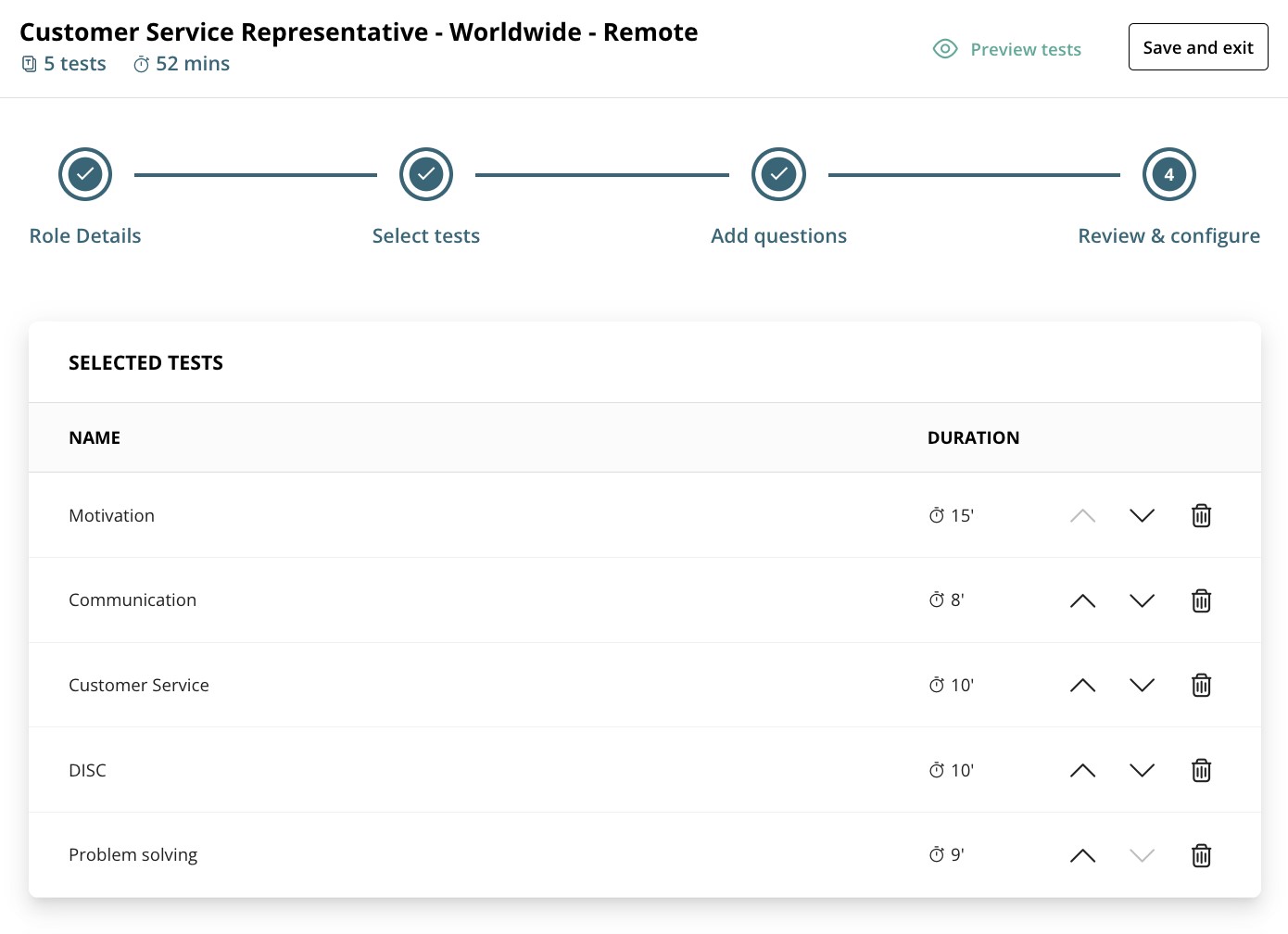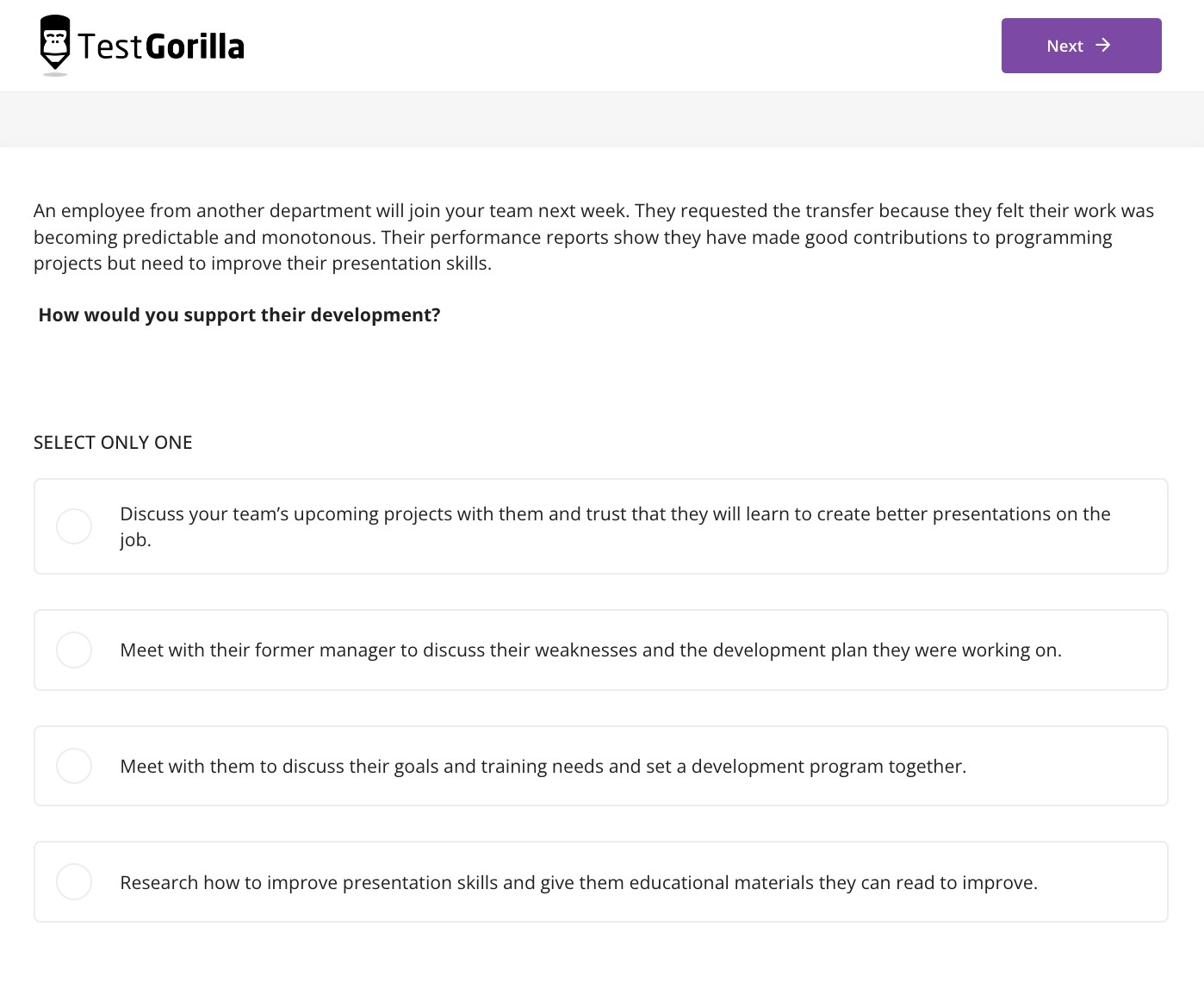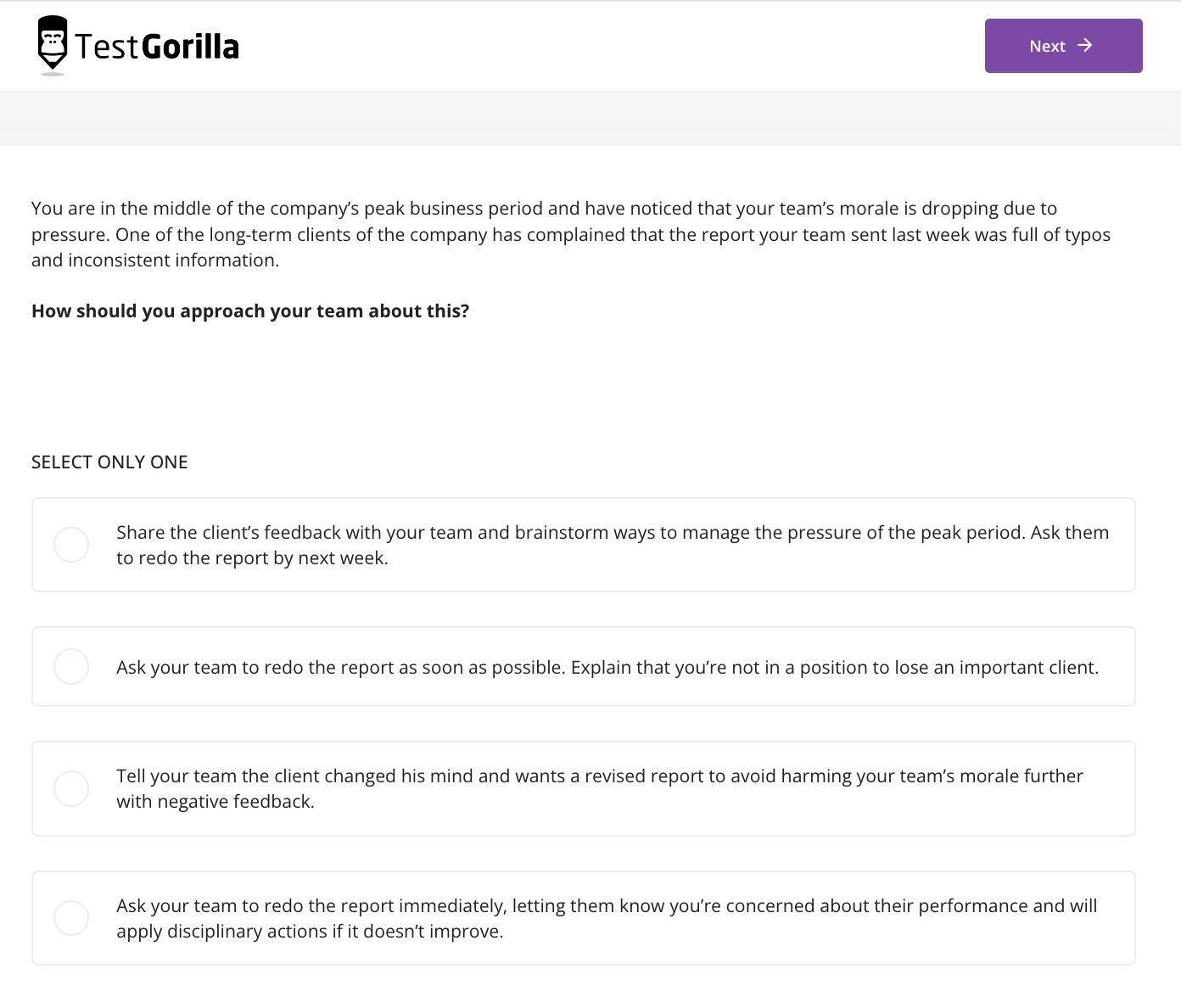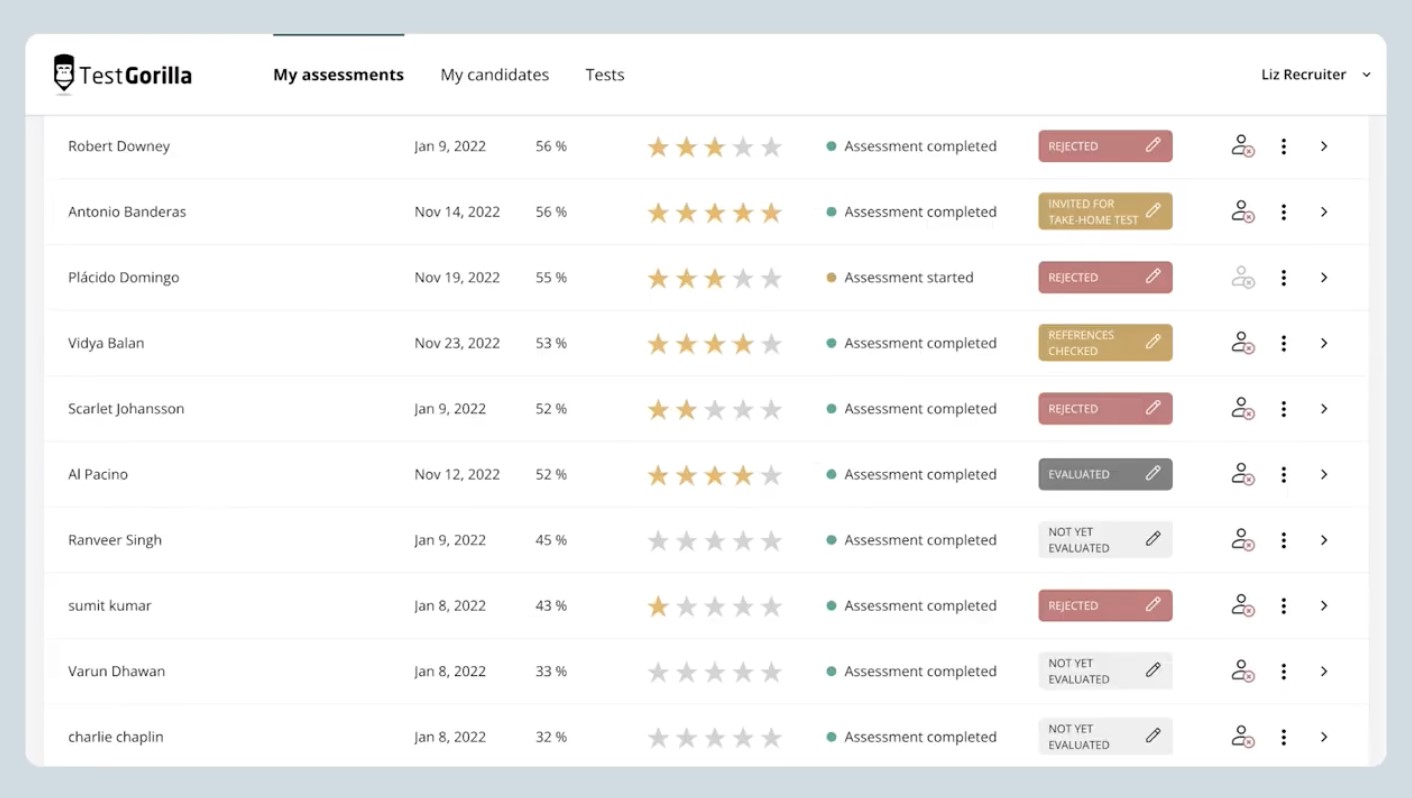Setting personal development goals is a great way to boost your self-confidence and your career potential. After all, having more skills and knowledge makes you more appealing to employers.
What if you’re keen to grow in your industry but are unsure of the best goals to set? On the other hand, as an HR manager, how can you support people’s growth goals for the better?
Below, we explore nine personal growth goals for work examples to support career development, confidence, and self-fulfillment.
Then, we explore how employers can aid their people with personal development goals for work – and help their best performers stay motivated and engaged.
Table of contents
- What are personal development goals and examples of personal growth goals?
- 9 examples of personal development goals for work
- How to support employees’ personal growth goals for work
- Prioritize personal development goals for maximum career potential
- Personal development goals and personal growth examples: FAQs
What are personal development goals and examples of personal growth goals?
Personal development goals are objectives individuals want to achieve, whether at work or in everyday life, to improve their health, career, wellbeing, and happiness. Personal development goals give people a better understanding of their own strengths and weaknesses, which means you know which natural talents to capitalize on and where you might need to improve along the way.
In terms of career growth, personal work goals examples can help people:
Measure and improve their skills
Gain confidence
Contemplate career paths
Seek out opportunities
Improve self-awareness and work-life balance
Manage professional relationships
There are benefits for HR professionals, too. Helping employees set unique and highly personal goals shows you value them as people. That’s appealing for talented people who are tired of working for companies just interested in the work they put out.
Setting and tracking clear goals also ensures skills gaps are easier to account for across the workforce. By measuring team members’ skill progress, matching them to promotion opportunities and making lateral moves is easier.
Personal development goals should be concrete, measurable, and achievable. For example, it’s the difference between “reduce stress at work” and “practice mindfulness three times a week to reduce stress at work.”
The second goal is a tangible milestone that helps you work toward the broader goal of reducing stress.
Employees with set, achievable goals feel more empowered in their professional lives than those who don’t. According to BiWorldwide, around eight in ten people with clear personal goals for work feel companies take their ideas seriously.
Dr. Gail Matthews’ studies into goal setting and effectiveness find that, overwhelmingly, people who set public, accountable goals are much more likely to achieve them than not. Those who submitted progress reports on their set goals had the highest mean achievement rate:
Therefore, we can easily infer that employees need managers to coach and help them stay accountable to hit their goals.
9 examples of personal development goals for work
There are countless personal development goals that individuals can set for themselves.
Here are just a few development goals examples that support career growth, no matter the role.
Examples of personal goals for work: A summary
Goal suggestions | Personal work goals examples |
1. Build relationships with people in the industry | Make 20 new connections in the industry by the end of the quarter |
2. Develop confidence in the role | Learn a new skill to help you perform better in your role, such as an extra language or software knowledge |
3. Improve productivity at work | Fully close five customer complaints by the end of the week |
4. Learn how to manage stress | Take regulated breaks without working through for the next month |
5. Improve decision making skills | Aim to make more decisions logically than emotionally by the end of the quarter |
6. Be better at giving and receiving feedback | Use less negative language when giving feedback over the next month |
7. Adopt regular mindfulness and self-reflection sessions | Practice mindful breathing once a day for a week |
8. Build up emotional intelligence | Aim to make three new friends by the end of the quarter |
9. Make time for learning and development | Read ten new books by the end of the year |
Let’s explore these examples of personal growth goals in more detail.
1. Build relationships with people in the industry
Building professional relationships helps people connect to decision makers in their industries. Networking opens new business opportunities and enables you to show off your skills and hard work to broader audiences.
This kind of goal naturally improves your communication skills, too. You can use the opportunity to leave your comfort zone, improve your public speaking skills, and practice active listening. All of these boast incredible benefits for your professional self-esteem.
You could:
Make a specific number of contacts within a certain time frame
Attend a networking event once a month for the next quarter
2. Develop confidence in the role
Confidence plays a massive role in various aspects of an individual’s life. It affects most things, from building relationships with significant others to asking for a promotion or handling a job interview positively.
Self confidence at work helps you feel more motivated to seize opportunities, put more effort into projects, and present yourself positively around others. These qualities make you appear more trustworthy, employable, and productive.
As a junior executive, for example, you could become a more confident communicator by reducing how often you hesitate when giving a presentation. Try setting a timeframe – say, reduce to five hesitations per talk in the next month.
You could apply this to learning new skills. Say you’re a programmer with exceptional skills in Python but feel less confident working with JavaScript. You could set a goal of running a simple program in JavaScript within the next 30 days.
3. Improve productivity at work
Improving productivity doesn’t mean increasing working hours; instead, it aims to help you handle tasks and objectives more efficiently and effectively.
When you’re more productive, you learn to manage your time better, understanding which projects to take on and how much time they need. You improve your work ethic and avoid procrastination.
Highly productive people are ideal candidates for leadership development, thanks to their organizational and time management skills.
Suppose you work as a technical support case manager – you could aim to close a set number of cases with positive outcomes over the next quarter.
4. Learn how to manage stress
Stress management helps you avoid burnout, handle difficult tasks, and manage tricky situations. It’s one of several personal goals for work that are highly transferable into other areas of your life.
Up to 25% of people have suffered burnout. Therefore, managing stress is a highly transferable skill.
Handling stressful situations at work shows employers that you can think critically, avoid bias, and have the confidence to lead. For instance, for people working with shift coordination or in industries where there’s a critical duty of care, such as medicine and nursing, it’s a real asset.
Focus on specific goals set around what you could do to feel less stressed and improve your self-care. You could:
Aim to sleep for a minimum of seven hours a day for a month
Take at least one personal mental health day a month
5. Improve decision making skills
Decision making is a skill everyone can learn. It has three different levels – emotional, value-based, and logical.
Emotional decision making is when employees allow their emotions to dictate their choices, while value-based decision finds its foundation in one’s personal beliefs.
Logical decision making, meanwhile, is the most highly valued by employers of the three. People who make logical decisions can do so calmly under pressure, with hard data, and without personal bias.
Employers can measure candidates’ decision making ability using skills tests like the Big 5 (OCEAN) personality exam.
To improve your decision making skills, you could set a personal development goal to move from emotional decision making to a more logic-based decision making process within a set time frame.
Then, keep a journal of your workplace decisions and look back at what determined your choices. You could keep this journal regularly for work decisions for three months.
Did you, for instance, avoid having an awkward conversation with a co-worker regarding a deadline? Was that an emotional decision, purposely avoiding conflict, or a logical one, because the interaction wasn’t needed? Could you have made better decisions in certain scenarios?
6. Be better at giving and receiving feedback
Regardless of industry and situation, many team problems can be solved by people knowing how to give and receive feedback better.
A team open to honest feedback grows quickly and learns from its mistakes. Team
members learn about their blind spots and start working on them to protect their productivity.
Someone who takes and understands feedback as a positive, professional boost applies this new knowledge to future projects.
Being better at giving feedback is often a matter of critical thinking and confidence. Influential leaders know that their employees improve when given constructive direction.
A good goal for receiving feedback might be reducing your defensiveness. For instance, over the next two months, you could reduce the negative language you give in response.
When giving feedback, aim to offer a fair balance of positive and negative comments.
7. Adopt regular mindfulness and self-reflection sessions
We don’t learn, change, and evolve just by experiencing things. We need to reflect on those experiences, too!
Practicing mindfulness and presence can be a beneficial personal development goal. These practices help people stay in the moment, which helps them better focus on tasks.
When you’re mindful and reflective, you’re less stressed, prioritize self-improvement, and manage your time better. These are all ideal traits for leaders and people with high responsibility.
You could set a goal to meditate two or three times a week for a month and track how you feel and perform at work.
8. Build up emotional intelligence
As David Goleman, author of the 1995 book “Emotional Intelligence” says, “Emotional intelligence is the key to both personal and professional success.” Therefore, it’s a great personal development goal.
High emotional intelligence revolves around empathy, self-control, and teamwork skills.
Emotionally intelligent people can “read” emotions better, communicate their own emotions more effectively, and know how to detach their present emotions from their actions.
They’re great leaders, too. Up to 76% of employees with empathetic leaders say they feel more engaged.
Building up emotional intelligence can mean changing various aspects of your life. For instance, increased exercise can positively affect your mental state.
With that in mind, you could:
Take three walks a week for the next two months
Go to the gym at least once a week for the next quarter
Make more time for friends and family
9. Make time for learning and development
The last of our examples of personal growth goals is one of the most important – without learning and development, it’s tough to grow as a professional.
Learning and development mean different things to different people. It could mean reading new books, trying new activities, or practicing skills to get better at them.
Carol Dweck, in her book, “Mindset,” describes two types of outlooks: fixed and growth mindsets.
A fixed mindset is when individuals understand their skill sets to be predetermined and defined by their natural talent. People with fixed mindsets impose limits on themselves.
With a growth mindset, on the other hand, individuals believe that their potential is limitless, so they dedicate much of their time to learning and realizing that potential. As you’d imagine, this is a common mindset among many successful people.
To begin developing a growth mindset, first, consider what sort of learner you are. Do you learn better by following examples, reading, or taking action? If you learn more by reading, you could set several books in your niche to read within a timeframe, or you could set a new skill to learn within three months and test yourself.
How to support employees’ personal growth goals for work
Supporting employees’ personal growth goals helps you develop a team of well-rounded, satisfied, and highly motivated employees. Back in 2021, Monster reported that 45% of employees would stay with a company if they had more learning and development opportunities (and we’re confident that this figure is higher today).
This means by helping people reach their personal goals for work, you’re likely to reduce turnover.
Let’s explore three ways to support your employees’ personal development goals more.
Development goals examples: How to support your workforce
Ways to support your employees | Summary |
Give access to training and development opportunities | Give everyone the chance to learn new skills through development plans, knowledge bases, and skills marketplaces |
Set aside regular check-ins | Create a roadmap with each employee so they can easily track their progress |
Test people on their personal development goals regularly | Use skills tests to measure training progress and support your development decision making |
1. Give access to training and development opportunities
Help your people access guides, books, online courses, or other resources to support their professional development goals and assist in their goal setting.
This way, you give people more autonomy over their learning while showing them you care about the progression of their long-term goals. For example, you could create a “library budget,” giving each employee a stipend to invest in their education.
You could also set up a knowledge base or a skills marketplace platform where people can download materials, take tests, and learn new skills via personal and professional development plans. And don’t forget to share personal development plans for work examples, such as templates and checklists specific to different roles and departments.
Remember to mix up your training materials. For instance, some people learn better from video, so produce video tutorials on goal setting alongside templates.
2. Set aside regular check-ins
Show people you’re committed to their self-development by scheduling weekly personal development periods.
These could be self-guided. Employees might practice developer or programming skills on company apps, or managers could lead them by discussing opportunities in 1:1 meetings.
You could help your employees by creating examples of personal growth goals if they struggle to visualize where they want to be.
For example, create a specific set of skill tests through TestGorilla to measure customer service aptitude:
It’s just one element of our test builder suite available from the get-go when you register for a free forever account.
Make your own custom assessments
Start building your own custom assessments for free today using TestGorilla.
3. Test people on their personal development goals regularly
We recommend skills-based hiring from the outset of your hiring process, but testing is important for employees onboard, too. For people aiming to develop specific skills and progress through your company, testing skills regularly is a must.
Continually testing skills during hiring and development helps companies align people to the positions for which they’re best suited.
For example, 7Systems, working with TestGorilla, used skills tests to understand its employees and saw marked improvement in role performance.
Once an employee looks through personal growth examples and decides how they’d like to develop, choose relevant tests to measure their progress. If you’re helping someone develop as a leader, you could test their leadership skills and attitude with a Leadership and People Management test:
The same talent assessment judges how people handle areas of potential conflict:
Beyond this, measuring aptitude through the TestGorilla platform lets you compare employees' results and track progress on their set personal development goals.
If you’d like to see how TestGorilla works in person, we recommend taking our free 30-minute demo. That way, you can see how we can tailor our platform to your testing needs.
Prioritize personal development goals for maximum career potential
We all want to be the best versions of ourselves, and with personal development goals, it’s easy to track improvement.
As an individual, setting personal growth goals helps you visualize where you want to go and build yourself into someone the best employers want to hire.
As an HR manager, investing in your employees pays dividends. They’re learning, improving, and likely staying with a company that provides them with opportunities to grow and develop.
With skills testing, you can:
Measure development
Find out where people might need help
Show employees how far they’ve come
Now that you’ve seen some personal growth examples and learned how to support your teams, it’s time to start thinking about skills-based hiring and development.
A great starting point is taking TestGorilla’s free product tour before setting any development goals examples.
If you’d prefer to see how it works tailored to the skills you need for specific roles, let us take you through a free 30-minute demo.
Remember, you can take complete control of skills testing on your own time – with our free forever plan.
Personal development goals and personal growth examples: FAQs
Let’s finish our guide with some common questions and answers about personal goals for work.
What is a SMART personal goal?
A SMART personal goal is Specific, Measurable, Achievable, Relevant, and Time-bound. It’s a system that helps people set attainable long-term or short-term goals. An example SMART goal might be to improve your average customer service review scores by 25% by the end of a working month.
What is personal development at work?
Personal development at work is your growth as an employee through improving skills, obtaining new knowledge, and taking on new challenges. At work, you might develop your skills by taking on new responsibilities, shadowing other people, or learning more about steps you should take to achieve your career goals.
What are the 5 areas of personal growth?
Mental growth: How you learn, think, and process
Social growth: How you communicate with people and socialize with others
Emotional growth: How you handle emotions in pressurized situations
Spiritual growth: How you connect to personally important beliefs
Physical growth: How your body and physical health develop over time
How do you write personal development examples for work?
Start with a specific end goal in mind – what do you want to achieve?
Break your goal down so it’s easy to measure
Create a challenge, but make sure you can still beat it
Make it highly motivational and relevant to your personal life
Set a clear timeframe for when you want to meet your goal and include actionable steps to get there
Record it in writing or set it with a manager or colleague
What are some personal development goals for work examples?
Some personal development examples for work could include improving your response to feedback, the number of tasks you complete, or your handling of stressful situations. All three could help you become more self-confident and develop as a model employee.
What's the difference between a personal goal for work and a professional development goal?
Personal goals for work – like finding a better work-life balance or improving relationships with colleagues – aim to make your day-to-day work experience more satisfying. Meanwhile, professional development goals – like learning new skills or tackling challenging projects – usually focus on helping you grow in your career. Although they may seem separate, personal and professional goals often overlap! Personal fulfillment can boost professional success, and professional success can boost personal fulfillment.
For more personal development goals for work examples, scroll up and take a look at our in-depth guide under the “9 examples of personal development goals for work” heading.
Related posts
Hire the best candidates with TestGorilla
Create pre-employment assessments in minutes to screen candidates, save time, and hire the best talent.
Latest posts
The best advice in pre-employment testing, in your inbox.
No spam. Unsubscribe at any time.

Hire the best. No bias. No stress.
Our screening tests identify the best candidates and make your hiring decisions faster, easier, and bias-free.
Free resources
This checklist covers key features you should look for when choosing a skills testing platform
This resource will help you develop an onboarding checklist for new hires.
How to assess your candidates' attention to detail.
Learn how to get human resources certified through HRCI or SHRM.
Learn how you can improve the level of talent at your company.
Learn how CapitalT reduced hiring bias with online skills assessments.
Learn how to make the resume process more efficient and more effective.
Improve your hiring strategy with these 7 critical recruitment metrics.
Learn how Sukhi decreased time spent reviewing resumes by 83%!
Hire more efficiently with these hacks that 99% of recruiters aren't using.
Make a business case for diversity and inclusion initiatives with this data.

